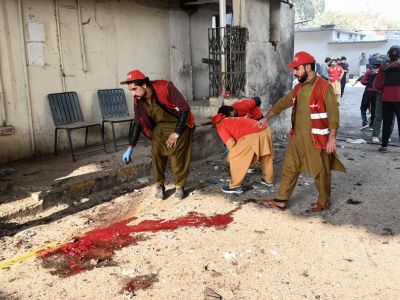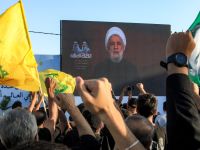Israel’s Palestinian citizens, who are sometimes called Arab Israelis, make up about 19 percent of the Jewish state’s population.
Since the outbreak of the latest Palestinian uprising against 34 years of military occupation, Israeli security forces have shot dead 13 members of this community. Anti-occupation Israelis at the time of the killings last November observed that although both Arab and Jewish citizens were demonstrating and blocking roads, the police immediately resorted to lethal force with the former, while relying on tear gas and batons with the latter.
Besides their often tense relations with the Israeli government, Palestinians in the Jewish state frequently complain that they are shunned by the Arab and Muslim world for allegedly collaborating with Zionism.
In this climate, Palestinian community leaders in Israel struggle with questions of identity, strategy and the next step forward. One of these leaders, journalist Lutfy Mash’our, spoke to Albawaba.com about the effects of the Intifada and his community’s prospects for the future.
Mash’our, the editor-in-chief and sole owner, with his family, of the Arabic biweekly As Sennara, revealed that being a Palestinian in Israel is becoming more and more difficult, and that some kind of “separation” could be on the way.
Q. How has the most recent Palestinian uprising increased or decreased the connections of Israel’s Arab population with the rest of the Arab World?
A. We’ve always been part of the Palestinian people and the Arab nation, as well as the Islamic world, but the Intifada has made us much closer.
This is mainly because the Israeli government treated us not as residents or citizens, but as foreigners, or a fifth column. It was the first time, despite the fact that we’ve faced so much discrimination. But when they began to shoot us, it was the end of our legitimacy as Israelis. When they shoot you in Nazareth and kill you in other places, they erase the borders that keep you as Israelis. It was a declaration that “You are like the Palestinians.”
But it wasn’t only the killing. After that, they boycotted us in terms of the economy and distribution of goods. We’ve been not only the enemies, but also non-consumers, which is much harder than the political or security fields.
Q. What role does the Arab population in Israel play in shaping the politics of the country?
A. Almost nothing – we’ve always been addressed at election time, then we’ve always been neglected. I don’t think that we have an influence – we want to be parties in the decision-making, but we’ve never been. It’s not just the Arab community, it’s the members of Knesset – even the Arab Israeli members of Knesset are disappointed, and believe that they will never have influence. And because of that, they are behaving the way they are now, in terms of their legitimacy.
Q. Do you prefer the term “Palestinian” or “Arab Israeli?”
A. It’s not a matter of what I prefer – in reality, we are Palestinians, we are part of the Palestinian people, we were before 1948, we still are, and we’ve been treated that way, maybe worse – some of our brothers had their hands shaken, like Arafat, but we never have.
So we feel we are part of the Palestinian and the Arab worlds, and the Muslims among us, who are about 80 percent, think that they are also part of the Islamic world.
I’ve said so many times that I prefer to be 100 percent Palestinian and 100 percent Israeli, but since it’s impossible, I would like to try to be 50 Palestinian and 50 percent Israeli. But when one side of me is threatened, it splits - always 90 to 95 percent Palestinian, five per cent Israeli. The Arab minority people, and the leaders in Knesset, have always tried to be legitimate here, and still keep our identity, but we have no chance.
For me, the events last October were something very new – we came to a crossroads. In recent months, we’ve been feeling that we’ve been heading for separation, but it’s not our choice – maybe it’s not the choice of the most people in Israel, but it’s the result of the government’s policies. I am not optimistic at all.
We’ve always been promised that they would do something for us, but they’ve all admitted there’s no inequality – and told us, “Please wait for a peace treaty for equality.” But I don’t think they really mean it. I think we’ll get to a point, if not now, then in 20 years, when they’ll tell us: “You’ll never have your rights, you’ll never be legitimate - anyone who wants full rights can move to the Palestinian state."
Q. What is the economic situation of the Palestinian Israelis, and how much or how little do they benefit or suffer from government actions?
A. We make up about 19 percent of the population, but we don’t have a single factory – we have some work, but in general we have nothing here. We are consumers.
We had two agricultural activities – tobacco production, which was destroyed by the government, and we still have the olive tree. It’s a big thing, but most of our products are not promoted, so we are zero in terms of factories or industry.
But we do account for more than 19 percent of the consumers. In areas like food or clothing, we hold more than 38 percent of the consuming power.
Unemployment in our sector is about 30 percent, and in the twenty or so towns listed, we are always first. And in terms of real unemployment, it’s much higher, because most of our people have never been employed, and when they talk about unemployment, they go back to people who once worked.
Q. What is the most important thing that the Arab World can do to make the situation of the Palestinians in Israel more bearable?
A. I want to emphasize that all the activities of the Arabs in Israel are aimed at being part of Israel, and to still stay part of the Palestinian people and the Arab World, and that we want our legitimacy in order to gain equality.
The Arab World can really help us, in terms of dealing with Israel, in so many ways, but we never sit around here saying that we want help with development or financing from Arab World. We now get much more money or grants from the Jewish Federation, rather than from the Arabs, maybe because we thought that we couldn’t do that because Israel would see it as an illegitimate action.
We believe we should sit back, observe and think, and then decide about where to go from here. The main point is that we’re part of Israel and pay taxes, and should be treated much more seriously by the government of Israel.
(Israeli Foreign Minister Shimon) Peres told me once that “You shouldn’t look for money from abroad, from the Arab World, you are citizens of Israel and the government should help you.” I told him, “Even when you were the prime minister, you did nothing for us.”
I think, for example, that the Islamic movement gets money from abroad, and of course organizations and countries all over the world are supporting parties and NGOs and people, and it’s very bad for us, really. (Palestinian President Yasser) Arafat has given away millions, not for the benefit of the people, just for the parties, and I know the PLO and others have given so much money to at least 1,200 addresses - writers, NGOs - in Israel. But most of the money was for buying people and allies. For the benefit of the recipients.
I myself think we should never get money from abroad because it hurts our struggle. Most of the NGOs that claim to be so nationalist, so Arab, are getting money from Jewish organizations inside and outside Israel, but for me, I call these things “national prostitution” – they have never helped our society, and instead they have destroyed so many good things. We’ve published a lot of articles about how that’s corrupting people.
Q. The word is that there will be demonstrations in November to mark the anniversary of the killing of the 13 Arab Israelis by the Israeli police. What do you think will be the outcome of that?
A. After those events in the West Bank and Gaza, the Arabs here tried so hard to address the Israeli public and to express and emphasize that everything we do is to be part of this state, while still keeping our unique identity. But I am not optimistic.
I hope that things will end in a good way. It depends not only on the government, but on the people here, who are not going to create confrontations, but will definitely fight for their right to demonstrate and express their feelings. The side that made things dangerous is not the Arab Israelis, because when we got to the streets we thought we had rights and could use them – nobody went into the streets to get shot.
I myself have always been fighting in two areas – against discrimination and attacks on us, and at the same time I’ve been saying we should clean our own house. If we don’t clean our own house and put an end to corruption in so many fields, we can’t struggle and face the “enemies.” That’s one thing I’ve always been trying to criticize in order to be able to face the others, and in order to be able to convince them that we are not a fifth column.
For me, what’s really important is the Israeli people, not the politicians, because they are really shocked, like us. As a minority, we should let them know that we haven’t forgotten the 50 years of bad and good things we’ve faced together. I think we should really move to calm the mood, but with the Jewish people, not with the politicians.
I think we have no other alternative but to keep talking, struggling, and to keep our land and our status, and to be part of the Palestinian and Islamic and Arab worlds.









